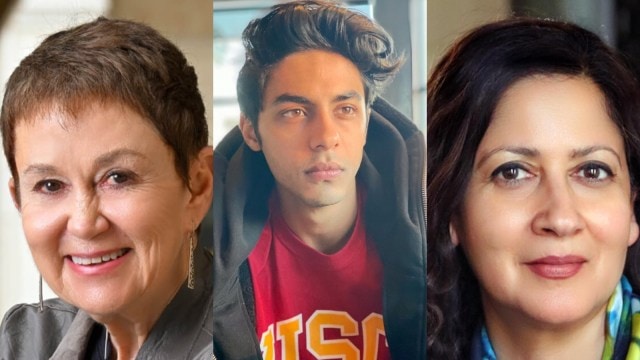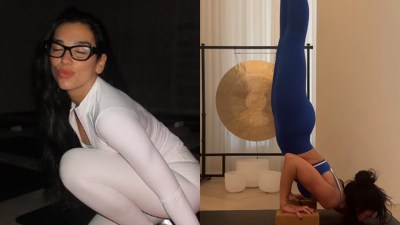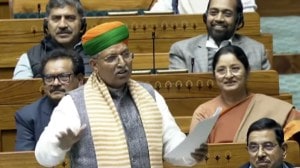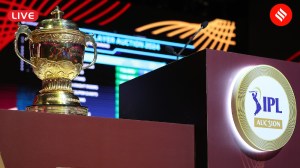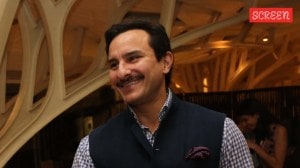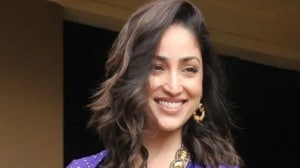Aryan Khan is assembling the crew for his directorial debut, and he is looking inwards. The dean and professor at the University of Southern California (USC) School of Cinematic Arts, from where Aryan Khan graduated, have spilled beans on how he was as a student.
Elizabeth Daley – Dean, USC School of Cinematic Arts, and Dr Priya Jaikumar, Professor and Chair of the Division of Cinema and Media Studies, USC School of Cinematic Arts were in the city last week, where the duo sat down to chat with Indianexpress.com. USC’s President, Carol Folt, and industry thought leaders joined for a ‘USC India Innovation Summit’.

Indian Express Entertainment is now on WhatsApp Channels. Follow us for the latest news, interviews, reviews, photos and more
In the interview, Elizabeth Daley and Priya Jaikumar spoke about Indian storytelling and how the West is looking at Indian cinema post SS Rajamouli’s historic Oscar run with RRR.
Edited excerpts:
Is there a renewed interest in the Indian storytelling landscape, especially in the last few years because of the SS Rajamouli and RRR explosion?
Priya Jaikumar: When I came to the US in ’91 is when Elizabeth started as a dean but I was a student there and I would say Indian Cinema and they’d say ‘Satyajit Ray’ but now they say ‘Bollywood’, then I say ‘No-no, there are also people like Ray!’ ‘Bollywood’ is a certain corporate, commercial version of Bombay cinema, there is also Tamil cinema, Marathi cinema… But that (Bollywood) has traveled very well and it’s true that DDLJ marked a certain turning point, Dil Chahta Hai marked a certain turning point and then of course streaming platforms…
On Rajamouli, I think there’s a very fundamental level at which these films viscerally get a response. I saw people, who are not Telugu, not Tamil, not Indians, responding to them partly by curiosity, partly because things go viral… The dance travels outside of the film’s context, so that’s kind of technologically enabled. But then still, how a film lands is different…
Story continues below this ad
It’s very interesting actually even in terms of its own culture and politics. But somebody else from the US may just respond at the level of ‘That’s a great beat’. At the marketing level, nothing wrong with that. People are looking from the business side to see what it is that will resonate across populations. For cultural analysts like me, I want to bring out the nuance and I want to say, ‘Well, different people are responding in different ways.’
Elizabeth Daley: When I was growing up there was no way to see an Indian film. Now one of the blessings of Netflix and all the technology is that Priya can tell me about an interesting Indian film, and I can actually go see it, I can find it. We often send out reading list of students to say ‘When you come, we expect that you will at least see these films. Don’t come in and act like you’ve never seen them’. Now you can put an Indian film on or you can put a Korean film on and it’s available. So, I think it’s broadened the general public.
And, yes, they like the beat, they like the dance number but also what has always interested me about the impact of this is that the foreground of most films are all the same. Those things where a boy meets a girl, boy loses girl, parents fight– it is same; every culture tells the same stories because they’re the basic human stories. But the backgrounds are very different, and they tell you a great deal about the culture.
Is there something that Indian filmmakers need to do to break out globally more often?
Story continues below this ad
Elizabeth Daley: What we are hearing from Indian filmmakers, I think in the last few days, are that they are just some basic skills that are needed here. One of them said to me, I’m not judging whether you have or not, but one of them said to me ‘We don’t really have a substantial film school. That we have subtler pieces here and pieces there but there’s no comprehensive film school.’ I don’t know if that’s the answer or not but what we’ve heard a lot is we need help in screenwriting, we need help in creative producing. I think those were the two big things that they really talked about.
How was Aryan Khan as a student?
Priya Jaikumar: Oddly, we never met him when he was there because COVID was what took one and a half years… There is one class called ‘Intro to Cinema’, everyone has to take it. But I know of my graduate students who were TAs for that class because it is literally 350 students, two sections, and they worked with Aryan. So, we were actually talking to his dad (Shah Rukh) as well. Aryan has a streaming show coming out and what he mentioned was that he was very influenced by his time at USC and in Cinematic Arts. So, he’s working with at least 2-3 other people from there.
Elizabeth Daley: His dad offered him some professional crew but Aryan said, ‘No, no, I am bringing my USC friends!’ He graduated the year we had commencement in the Colosseum; that was the end of the COVID because we couldn’t be indoors.
Story continues below this ad
Priya Jaikumar: Ya, so Aryan was there. He graduated during COVID… Unfortunately, one on one interactions we didn’t have with him.
Elizabeth Daley: But we wanted to let him also have a normal life also.


